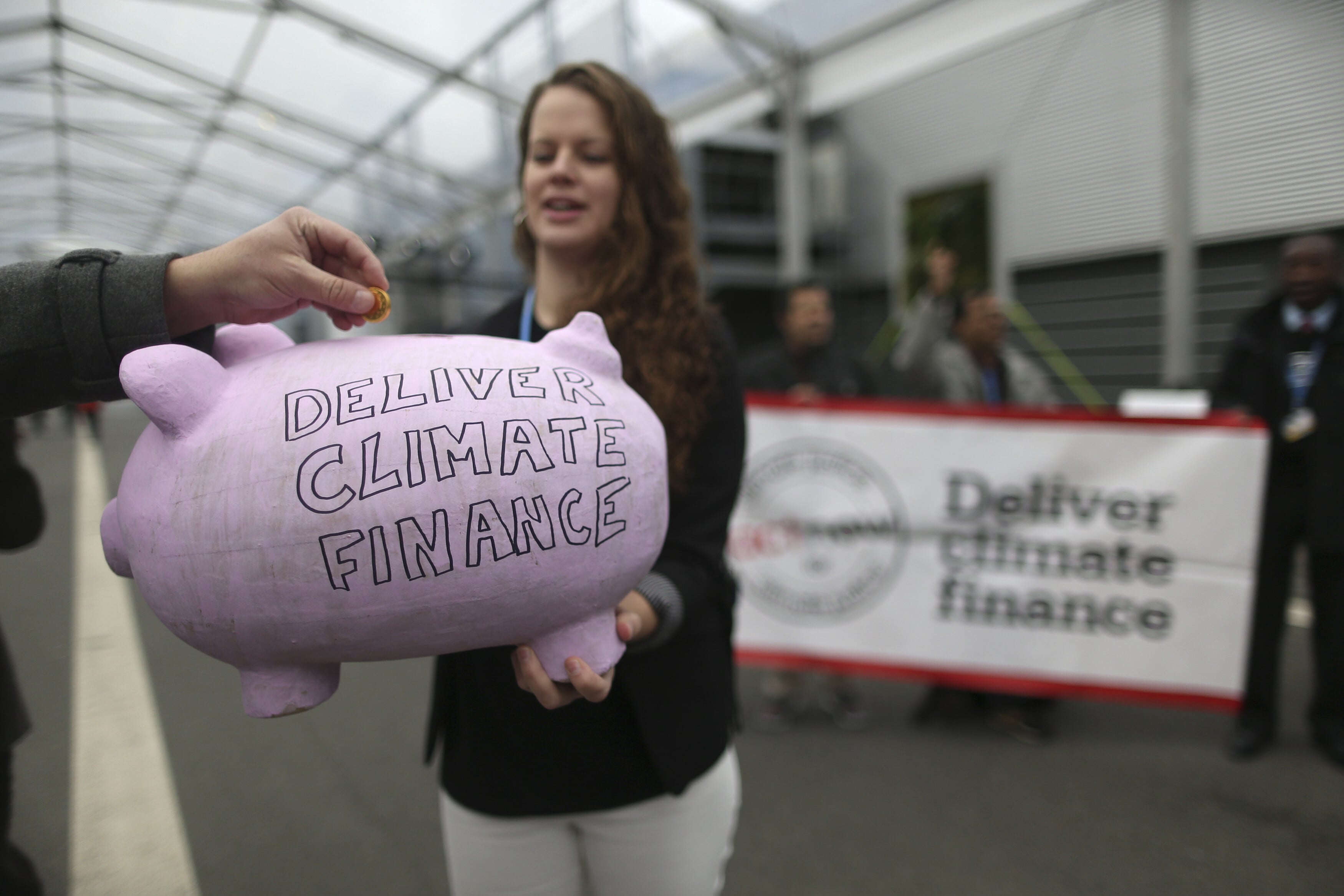Prince William issues stark ocean warning, and other nature and climate news
Britain's Prince William has told world leaders and businesses that our oceans are "diminishing before our eyes".
Image: REUTERS/Manon Cruz/Pool
- This weekly round-up contains the key nature and climate news from the past week.
- Top nature and climate news: Prince William urges leaders to act on ocean health; Cities around the world sinking at "worrying" speed; CO2 peak passes milestone.
1. UK's Prince William calls for urgent ocean action
Britain's Prince William has told world leaders and businesses that the challenge facing the world's oceans is "like none we have faced before" and that urgent action is needed to protect them, Reuters reports.
Speaking ahead of the UN Ocean Conference being held this week in France, he said that rising sea temperatures, plastic pollution and overfishing were putting pressure on the oceans' fragile ecosystems as well as the people who depend on them.
The heir to the British throne and founder of the Earthshot Prize told investors and policymakers at the Blue Economy and Finance Forum in Monaco: "What once seemed an abundant resource is diminishing before our eyes. Put simply: the ocean is under enormous threat, but it can revive itself. But, only if together we act now."
Prince William's office recently released a video (below) of a conversation he had with nature broadcaster David Attenborough about his new documentary on the plight of the oceans.
In the conversation, Attenborough told the Prince: "The thing which I am appalled by, when I first saw the shots that were taken for this film, are what we have done to the deep ocean floor," Attenborough told him. "If you did anything remotely like it on land, everybody would be up in arms."
Accept our marketing cookies to access this content.
These cookies are currently disabled in your browser.
Last year saw record sea-surface temperatures and near-record ocean heat content, according to the World Meteorological Organization. Marine heatwaves affected more than 10% of the global ocean.
Meanwhile, a new report has said that levels of ocean acidification – caused by the rapid absorption of CO2 by the oceans – have crossed a crucial threshold for the health of the planet. The study called this acidification a "ticking time bomb" for marine ecosystems and coastal communities.
Maintaining the balance and health of the ocean is essential for the survival of all forms of life, the United Nations (UN) reminds. It is also the key to employment for more than 100 million people and holds significant economic value equivalent to about 3-5% of global GDP, according to the World Economic Forum's Ocean Action Agenda.
The initiative is working to create partnerships to achieve a thriving and healthy ocean that supports social and economic needs.
2. Dozens of coastal cities sinking at alarming speed: report
Cities around the world are sinking at "worrying speed", according to a report that studied relative sea-level rise resulting from local land subsidence in and around 48 coastal cities across Asia, Africa, Europe and the Americas.
About 76 million people live in parts of these cities that subsided on average at least 1cm per year between 2014 and 2020, the BBC says. Cities in the study include New York, Rio de Janeiro, London, Barcelona, Lagos and Tokyo – and many are in Southeast Asia.
While a variety of factors can contribute to subsidence, the report from Nanyang Technological University in Singapore suggests that groundwater extraction – which over time can compress the soil and cause the surface to sink – has had a major impact in half of the cities studied.
3. News in brief: Other top nature and climate stories this week
Deforestation in Colombia drops by a third in 2025 this year, says the environment ministry, thanks to an increase in coordination and effective efforts to halt activity such as illegal coca cultivation and unregulated mining advancing. (This news comes at a time when 17 of the 20 counties with the largest areas of primary forest see higher loss today than when a special COP26 deforestation agreement was signed just four years ago.)
The seasonal peak of atmospheric CO2 concentrations has exceeded 430 parts per million (ppm) for the first time at an observatory on Hawaii, the US National Oceanic and Atmospheric Administration has said. CO2 levels in the Northern Hemisphere peak in May before falling during plants' growing season, then rising again as they die in the autumn. May figures this year averaged at 430.2 ppm – that's 3.5 ppm higher than the same measurement the previous year.
Indirect carbon emissions from four of the biggest AI-focused technology companies rose by an average of 150% from 2020-2023, according to a UN report. Some companies in the space are advancing "bold strategies" including long-term nuclear power purchase and AI-optimized efficiency to address the issue, the organization says.
The UK's largest nuclear site could continue leaking radioactive water into the ground until the 2050s, according to a report from the country's House of Commons. A spokesperson for the Nuclear Decommissioning Authority said the leak at Sellafield, which stopped generating electricity in 2003 and has been leaking since 2018, does not pose a risk to the public.
Unusually warm spring weather in the western US has contributed to rapid snowmelt, raising concerns around wildfire season amid limited resources. Mountains in some regions are already snow-free – the earliest complete melting of snowpack on record – and about a third of the western US is now in severe drought or worse, the Guardian reports.
Rhino poaching could be substantially reduced by removing the animals' horns, according to research published in Science. This action is dramatically more effective than other anti-poaching interventions, such as protective fencing or employing more rangers, the study suggests.
Trees can "remember" periods of water abundance and scarcity, research in Science says. The study helps to explain why drought kills some trees but not others, according to the researchers.
4. More on the nature and climate crisis from Forum Stories
A new wave of ocean innovators are working to improve the health of the ocean, with mapping tools, artificial seawalls, community-led projects and more. Learn about some of the key projects across the globe in the article below.
Have you read?
Accept our marketing cookies to access this content.
These cookies are currently disabled in your browser.
Climate change is devastating tropical reefs worldwide, with living corals already nearly wiped out in some regions. Deploying the necessary science and technology at scale to save reefs will require global financial and logistical collaboration, and the stakes are high: coral reefs generate hundreds of billions of dollars and support millions of livelihoods.
Amid rising temperatures and shrinking arable land, Colombia’s coffee industry has become a global model of how agriculture can adapt to climate change. Supportive national policies, public-private collaboration and targeted incentives have been key, enabling the country to align agricultural practices with global climate goals and reduce emissions, enhance biodiversity and improve livelihoods for farmers.
More on Climate ActionSee all
David Carlin and Sourajit Aiyer
July 28, 2025
Nasim Pour, Sebastien Cross and Joel Gould
July 28, 2025
Michael Wang
July 28, 2025
Naoko Tochibayashi
July 28, 2025
Jose Ignacio Galindo and Nicolas Wertheimer
July 24, 2025




